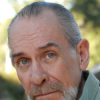Thomas Steinbeck

Thomas Steinbeck
Thomas Myles Steinbeckis a writer and the eldest son of Nobel Laureate John Steinbeck. Steinbeck, raised by his father and well educated, was drafted into the Vietnam War, inspiring him to become a photographer and journalist. Subsequently, he wrote numerous screenplays and worked in the film industry. Since 2002, he has been an author of original works, starting with his book of short stories, Down to a Soundless Sea, in 2002. His first novel, In the Shadow of the Cypress,...
NationalityAmerican
ProfessionWriter
Date of Birth2 August 1944
CountryUnited States of America
I thought my dad was out of work, because my friends had fathers with briefcases who'd go off somewhere with bow ties on. But my father would finish breakfast and go back to his room.
My father valued patriotism above all other social obligations, but he had his own particular interpretation of just how true patriotism was meant to function.
From my fathers point of view, without a thought for self, a true patriot stands up against the stones of condemnation and speaks for those who are given no real voice in the halls of justice or the halls of government.
I started writing serious books so late because I knew Id be accused of riding on my fathers coattails.
My father believed, like Pericles, that a mans genius could be easily judged by the number of unenlightened fools set in phalanx against his ideas.
My father thought of himself as a tradesman. A craftsman.
The biggest impact my father had on my life was teaching the importance of literacy.
When it comes to the form the narrative will take, whether first person, third person, or Aunt Grace's cat, I usually find that the story tells me which voice it prefers, and that often changes as I go along. And in the end it really doesn't matter as long as the author can rig those voices all in harness to pull the same load.
When I was fifteen, my father gave me a first edition copy of Ray Bradbury's magnificent work, 'The Martian Chronicles.' I had read other science fiction by noted authors, but this book was something else altogether.
I was eighteen when I first read Joseph Heller's stunning work 'Catch-22,' and was at that time close to being drafted for the fruitless and unenlightened war in Viet Nam.
Since I can't write the greatest American novel, I'm going to write the longest American novel.
My only job is to write in such a way that the reader gets a new handle on humanity.
I started writing serious books so late because I knew I'd be accused of riding on my father's coattails.
I would hardly say that I have a rich knowledge of anything in particular, but I do seem to be burdened with an unseemly appetite for intellectual and artistic erudition, which, for the sake of balance, I keep well harnessed to a reliable sense of the absurd.